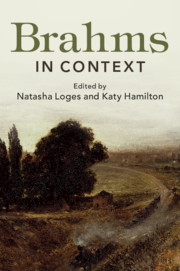Book contents
- Brahms in Context
- Brahms in Context
- Copyright page
- Dedication
- Contents
- Illustrations
- Music Examples
- Notes on Contributors
- Preface
- Abbreviations
- Part I Personality, People and Places
- Part II Identities, Environments and Influences
- Part III Performance and Publishing
- Part IV Society and Culture
- Part V Reception and Legacy
- Chapter 31 Germany
- Chapter 32 England
- Chapter 33 Analysis
- Chapter 34 The Era of National Socialism
- Chapter 35 Editing Brahms
- Chapter 36 Recordings
- Chapter 37 Historical Performance
- Chapter 38 Inspiration
- Chapter 39 Mythmaking
- Further Reading
- Index
- References
Chapter 34 - The Era of National Socialism
from Part V - Reception and Legacy
Published online by Cambridge University Press: 15 May 2019
- Brahms in Context
- Brahms in Context
- Copyright page
- Dedication
- Contents
- Illustrations
- Music Examples
- Notes on Contributors
- Preface
- Abbreviations
- Part I Personality, People and Places
- Part II Identities, Environments and Influences
- Part III Performance and Publishing
- Part IV Society and Culture
- Part V Reception and Legacy
- Chapter 31 Germany
- Chapter 32 England
- Chapter 33 Analysis
- Chapter 34 The Era of National Socialism
- Chapter 35 Editing Brahms
- Chapter 36 Recordings
- Chapter 37 Historical Performance
- Chapter 38 Inspiration
- Chapter 39 Mythmaking
- Further Reading
- Index
- References
Summary
While there is an extensive body of literature on the German reception of Brahms up to World War I, until recently, few scholars have shown an interest in the ways in which National Socialists dealt with this composer. In German publications, there seems to be little acknowledgement of the possible complexities in Brahms reception caused by political influences; most post-war German literature on the composer has simply skirted the issue. Some writers have even suggested that Brahms was not much used for political purposes by the Nazis. Such suggestions are typically supported through direct comparisons with the long-acknowledged appropriations of other composers, notably Wagner.
Indeed, statistics such as those of the Berlin Philharmonic show no change in the frequency of performances of Brahms’s works during Hitler’s rule, even despite the straitened circumstances towards the end of the war. It seems that with concert-goers the composer’s popularity was never in question.
- Type
- Chapter
- Information
- Brahms in Context , pp. 336 - 346Publisher: Cambridge University PressPrint publication year: 2019

